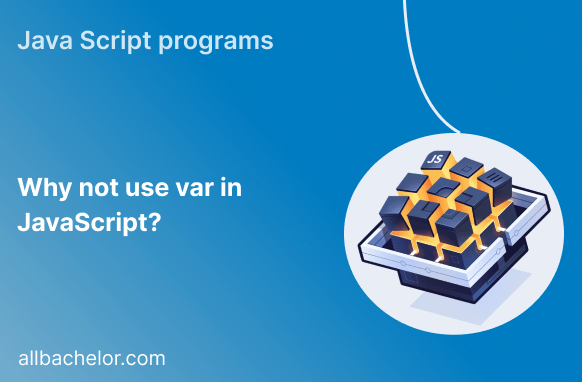Introduction:
In the world of JavaScript, declaring variables is essential for defining and handling data. Traditionally, the “var” keyword has been widely used for variable declaration. However, with the arrival of ES6, the introduction of “let” and “const” has brought notable advancements in scoping variables and preventing errors. This blog post will delve into why utilizing “var” in JavaScript may not be the most optimal option and will explore the benefits of adopting “let” and “const” instead.
Understanding the Purpose of Variable Declaration in JavaScript:
In JavaScript, variables are like containers that hold information, allowing us to work with data in our programs. They let us give names to values and use them in our code. Variables are useful for storing data temporarily or permanently, performing calculations, and making our code more adaptable and versatile.
Comparing Different Variable Declaration Keywords:
JavaScript provides multiple keywords for variable declaration: var, let, and const.
- var:
The var keyword has been present in JavaScript for a long time. It has a scope that extends to the entire function where it is declared. Unlike block-level scopes (like if statements or loops), var variables can be accessed from anywhere within the function. This lack of scope limitation can result in unintentional issues and errors. - let:
In ES6, the let keyword was introduced, which brings block-level scoping to JavaScript. When we declare variables using let, they are only accessible within the block where they are defined, such as an if statement or a loop. This enhancement in scoping helps make the code more understandable and minimizes the risk of variable conflicts or unexpected outcomes. - const:
ES6 also introduced the const keyword, which behaves similarly to let in terms of block-level scoping. However, const is specifically used for declaring constants, which are variables that cannot be changed after they are initially assigned a value. By enforcing immutability, const is valuable when you want to ensure that a particular value remains constant throughout your program.
Drawbacks of Using var:
Although var has been widely used in JavaScript, it has several limitations and pitfalls that make it less desirable in modern development practices.
- Variable Scoping Issues:
The function-level scoping of var variables can result in unintentional outcomes, particularly when we expect block-level scoping. With var, variables declared inside blocks can be accessed from outside, leading to conflicts and making the code more difficult to understand and analyze. - Hoisting:
- In JavaScript, variables declared with var are “hoisted,” meaning they are moved to the top of their scope regardless of where they are actually written in the code. This can be confusing and cause bugs when variables are accessed before they are declared explicitly.
Introducing let and const:
To address the limitations of var, ES6 introduced let and const as alternatives for variable declaration.
- Improved Scoping:
Both the let and const keywords provide block-level scoping, meaning that variables declared with them are limited to the blocks they are defined within. This helps maintain cleaner code and minimizes the chances of encountering unintended side effects or unexpected behavior in your program. - Block Scoping:
Block scoping enhances encapsulation and simplifies understanding of variable behavior within specific blocks, like if statements or loops. It enhances code maintainability and lowers the likelihood of variable conflicts.
Benefits of Embracing let and const:
The advantages of using let and const over var are numerous and contribute to writing cleaner, more robust code.
- Code Readability and Maintainability:
By using let and const, developers can express their intentions in a clearer manner. Block scoping enhances the comprehension of variable declaration and usage, resulting in code that is easier to read. Furthermore, const emphasizes immutability, indicating that specific values should remain unchanged throughout the program. - Bug Prevention:
The strict scoping rules of let and const are effective in detecting potential bugs at an early stage. These variables are confined to the blocks where they are required, minimizing the risk of accidental reuse or modification. This results in code behavior that is more predictable and fewer occurrences of bugs.
Performance Considerations:
When it comes to performance, there is no notable distinction between var, let, and const in JavaScript. JavaScript engines are designed to handle all three variable declarations efficiently, so the choice of keyword will not significantly impact the runtime performance of your code.
Use Cases and Exceptions:
While let and const are generally recommended, there might be exceptional cases where var is still preferred. Legacy codebases or specific compatibility requirements may necessitate the use of var. However, in most modern JavaScript projects, it is advisable to prioritize let and const for improved code quality.
Examples and Code Snippets:
To illustrate the differences between var, let, and const, consider the following code snippets:
// Example 1: Variable scoping with var
function example1() {
if (true) {
var x = 10;
}
console.log(x); // Output: 10
}
// Example 2: Variable scoping with let
function example2() {
if (true) {
let y = 20;
}
console.log(y); // Error: y is not defined
}
// Example 3: Constant declaration with const
const PI = 3.14159;
PI = 3.14; // Error: Assignment to a constant variableConclusion:
Over time, JavaScript has relied on the var keyword for variable declaration. However, the introduction of let and const has brought significant advancements to this aspect. Due to the limitations and drawbacks associated with var, developers are now embracing the benefits offered by let and const. By adopting these modern approaches, developers can effectively address scoping issues, reduce the occurrence of bugs, and enhance the readability and maintainability of their code. It’s time to say goodbye to var and welcome a new era of JavaScript programming.


